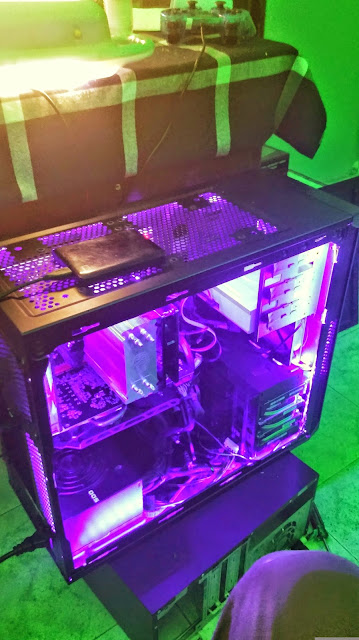There's
nothing quite like that on a console. If I want to play a PS3 game, I
can, with general confidence, pop in a PS3 game into my PS3 game and
it'll run as intended—provided there are no bugs, of course. Even now,
with a new generation of consoles, I can still get most of the new
hotness on my old system. Heck, over time, things start looking better on
consoles as developers learn how to optimize stuff. And when any
transitions to a new generation occur, I won't be able to take a new
game and pop it into my old system only to have it barely run in a
playable state.
This isn't a
knock on PC gaming, mind—it's just that getting left behind is a
different experience; you helplessly watch it happen. If you have a top
of the line system, over time, you go from running everything smoothly
to eventually acknowledging that you have to change up some parts or buy
a new build altogether to keep playing. There is no "ten year life
cycle," like you might sometimes find on consoles
Anyone is
capable of putting together a computer; of that I'm certain. But damn, I
can't describe to you the sheer terror I felt when I had all the
different computer parts out of their box for the first time; each with
their own little thick manual written in such a way that it almost
seemed like normal, everyday humans weren't supposed to be reading it. I
felt this way even though I had read up a bit on Lifehacker before starting.
I knew what the different parts were. I knew where everything went, in a
general matter of speaking. In a way, it was doing my homework which
made the entire thing so difficult. It's hard not to freak about having
to handle the brains of your computer when you might break it if you put
it in the wrong way, if the little pins get bent. PC parts aren't
cheap!
On my first
try putting stuff together, everything felt like agony: I knew which
parts were delicate, and anything involving those pieces seemed to
require more force than I was comfortable exerting. When placing my
processor on the motherboard, for example, I paid attention and made
sure to align stuff in accordance to the packaging—but just the same, I
kept doubting whether or not I put it in the right way. It didn't help
that when I tried to lock it in, it took so much force I think I
straight up imagined the sound of my processor crunching. Ack!
Let's not even talk about how anxious I was around touching the
motherboard after reading about how you can mess stuff up with static
electricity and how it's recommended that you wear something special to
avoid it, or how you're not supposed to touch the metal parts of the
motherboard. Yes, you can discharge yourself, but still: it's hard not
to get neurotic about the entire affair.
PC gaming has a lot of benefits, but the act of putting together a computer for the first time feels like running the gauntlet. Of course people are going to boast about it after surviving it. Over the years, I've heard people say over and over that building a computer isn't hard. If you've never built a computer before, I don't mean to scare you.
Intel core i7-4790 clock speed @ 3.6ghz turbo boost 4ghz 8M/LGA1150,Cooler Master Hyper 212 EVO Cooler. Processor Fan with Heatsink and Pipes and Aluminium Fins; Noise Level of 36 dB ThermalTake,Carbide Series 200, EVGA 500W PSU, Maximus VII ranger motherboard + Western Digital 2TB WD1003FZEX 7200RPM SATAIII Hard Drive, 2 Western Digital WD5003AZEX 500GB, HyperX Savage 16GB (2 x 8GB) 240-Pin DDR3 2400 (PC3 19200) Model HX324C11SRK2/16 Gigabyte radeon R9 270 Gaming graphics card with 2GB DDR5,DVD Writer
To contact the author of this post, write to mwiti.kevin@yahoo.com or find him on Facebook:www.facebook.com/kevin.kimz
Instagram: https://instagram.com/kevinkimz



No comments:
Post a Comment